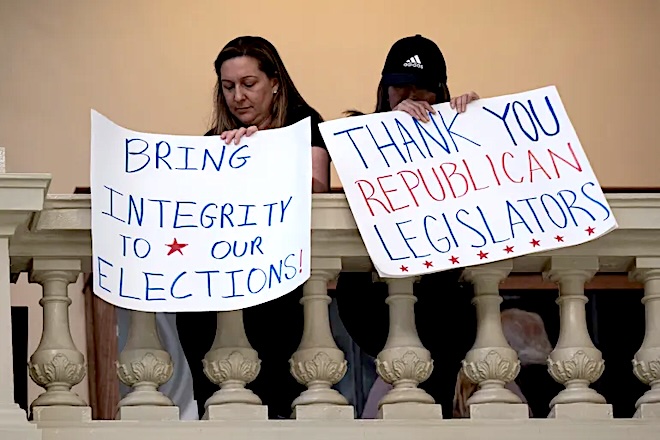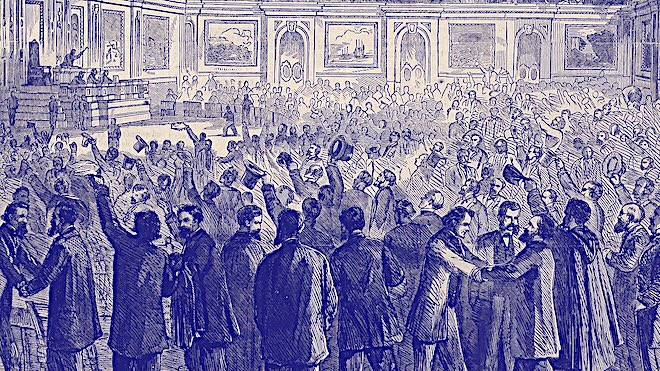Danger ahead - falling rocks
Voting in America ... Gerrymanders and voter suppression give Republicans a whopping advantage ... The 14th amendment and its possibilities ... The post-Civil War reconstruction amendments ... Trump and the suspension of the Constitution ... Roger Fitch explains

If more Americans had been able to vote in 2016, Donald Trump would have lost.
However, thanks to the supreme court's decision in Shelby County v Holder (2013), the 2016 presidential election was the first in 50 years without the essential protections of the 1965 Voting Rights Act, resulting in massive vote suppression.
After the court inexplicably struck down the recent, near-unanimous, re-enactment of the Act's provisions requiring federal pre-clearance of voting measures, a toxic torrent of voting restrictions poured forth from conservative (and racist) states.
Private enforcement actions remained, but in November 2023, a 2-1 panel of the 8th circuit issued a clearly-wrong decision that such actions are not allowed, though they've been used for 40 years during which time private litigants brought 182 successful lawsuits and the DoJ alone only 15.
Worse, four Republican states are cynically pursuing a two-pronged attack on the remnants of the VRA.
A third of eligible voters in America fail to vote. Why? It's the difficulty of doing so under Republican Party governance. Voting is voluntary, and it's actively discouraged through onerous registrations and voting, pointlessly-purged voter rolls, inconvenient polling sites, Tuesday elections, deliberately-burdensome ID requirements, restricted voting hours, and even punishments for poll assistance.
If one succeeds in voting, gerrymanders can give Republicans an advantage of 7% or more; in Wisconsin 47.5% of the vote gives Republicans a two-thirds super-majority in the legislature, enough to override executive actions of the progressive Democrat governor.
Enforcement of an overlooked provision of the 14th amendment might address these problems.
Americans are constantly reminded of the holy writ enshrined in the Constitution (1789) and Bill of Rights (Amendments 1-10, adopted 1791), but people know little about the Reconstruction Amendments hammered out by Congress after the Civil War, in debates rivalling those of the Philadelphia Constitutional Convention eighty years earlier.
 Reconstruction Amendments - deliberations
Reconstruction Amendments - deliberations
Following the Civil War, the 13th, 14th and 15th amendments were adopted to recast the Constitution and Bill of Rights, and vindicate the supremacy of the federal over state governments, not least in matters of citizenship, voting, and (gender aside) freedom from discrimination.
Most people have heard of the 13th Amendment, abolishing slavery, and perhaps the 15th, but it's the 14th that is most well-known, the amendment that turbo-charged the Bill of Rights. Properly interpreted, the 14th would be Donald Trump's kryptonite, as its Section 3 prohibits certain insurgents holding office.
The supreme court, however, seems sure to allow Trump on the ballot, simply deferring a constitutional crisis. Why? Perhaps because Section 3 doesn't mention the (Australian) ballot.
Other sections of the 14th are more consequential: Section 1 adds birthright citizenship, equal protection and privileges or immunities to the due process provided in the Bill of Rights, making these federal protections also those of state citizens. Then there is Section 2:
"Representatives shall be apportioned among the several States according to their respective numbers, counting the whole number of persons in each State ... when the right to vote at any election for the choice of electors for President and Vice President of the United States, Representatives in Congress, the Executive and Judicial officers of a State, or the members of the Legislature thereof, is denied to any of the male inhabitants of such State, being twenty-one years of age, and citizens of the United States, or in any way abridged, except for participation in rebellion, or other crime, the basis of representation therein shall be reduced in the proportion which the number of such male citizens shall bear to the whole number of male citizens twenty-one years of age in such State." (emphases added)
It was Section 2 that introduced a gender distinction for the first time through its "male" references: no mention of sex appears in the Constitution or Bill of Rights.
In Section 1, women were included in the same birthright citizenship, "privileges or immunities", due process, and equal protection as men. Yet during the compromises in drafting section 2, recognition of women was dropped: it was thought its inclusion would make ratification too difficult.
The campaign for women's suffrage had begun before the War, in the 1848 Seneca Falls Convention, and there were precedents for women voting, e.g, single women and widows voted in New Jersey from 1776 to 1807, when the all-male legislature put a stop to it.
Hence one purpose of Section 2 - in referring to male inhabitants and male citizens - was deterring states from increasing their representation in congress by enfranchising women, as soon occurred in Wyoming Territory (1869) and elsewhere in the West. The "male" distinction became redundant after the adoption of the 19th Amendment (1920).
The 15th Amendment also refers to "males", as it only sought to deal with racial, not sex, discrimination. What is striking is that the amendment does not contain a right to vote, something the US, alone among advanced democracies, lacks.
≈ ≈ ≈




No comments:
Post a Comment